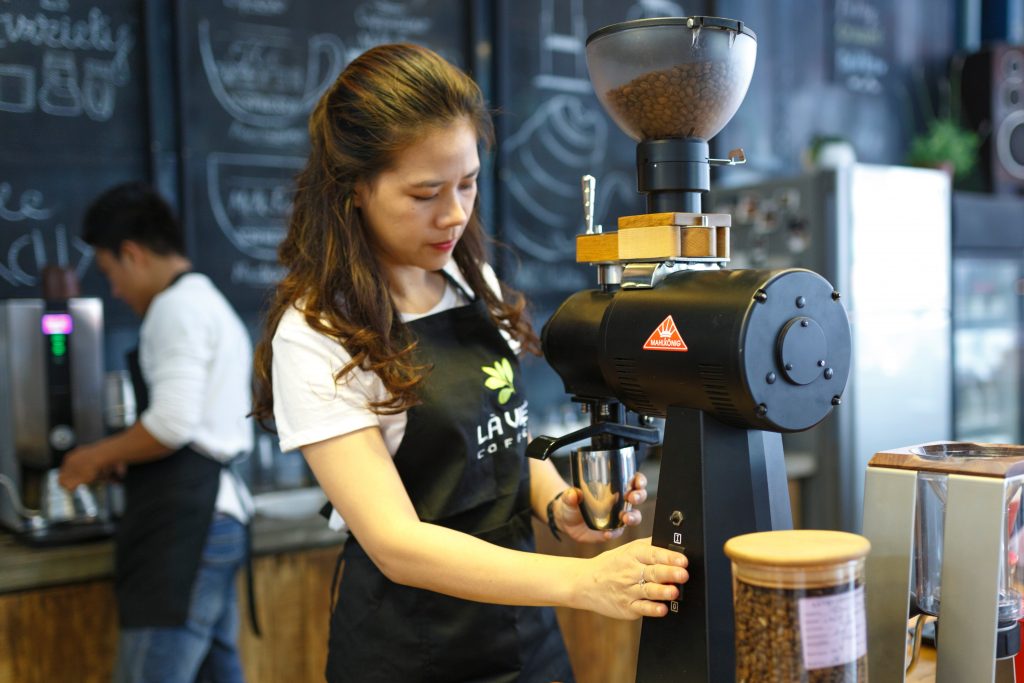Baristas are responsible for preparing and servicing various types of caffeinated beverages at different locations.
In the article below, we will cover the duties, qualifications, required training, and other aspects of the barista position.
Article Table of Contents
What Does a Barista Do
The position of a barista is highly popular across the country.
However, it’s not as easy as one might think.
Coffee is a very popular drink, so it has to be prepared properly.
So, the craft of baristas has moved to an art level.
In simple terms, baristas make coffee and other drinks with caffeine and serve them to customers.
Also, they should stay calm and be able to work in a fast-paced and stressful environment with a smile on their faces.

Responsibilities
- Preparing a wide variety of coffee and caffeinated products.
- Welcoming guests in the establishment and taking their orders as well as processing payments.
- Suggesting particular points from the menu based on quick observations.
- Selling coffee and brewing and grinding equipment.
- Explaining the difference between various coffee beans and preparation methods.
- Following coffee recipes and preparation techniques.
- Keeping a full stock of inventories.
- Ordering cookies, pastries, and other products served with coffee.
- Showing the operations of brewing equipment to colleagues and customers.
- Maintaining the operation of equipment and following instructions on equipment operation.
- Keeping the work environment safe and healthy by following organization and sanitation standards.
- Studying, analyzing, redesigning processes, and constantly improving procedures and implementing changes.
- Cleaning and organizing the working areas and creating and fixing up stock displays.
- Promoting new products and describing current promotions.
- Ensuring customer satisfaction, even if it means replacing products.
- Opening and closing the establishment.
Essential Skills
Customer service:
Baristas work directly with customers, so they need excellent customer-oriented skills and approaches.
They should be friendly and able to satisfy the needs of customers.
Problem-solving:
Baristas need to resolve various issues such as technical problems, mixed orders or displeased customers.
Therefore, they need excellent problem-solving skills and to perform well under pressure.
Multi-tasking:
Baristas may have to deal with multiple tasks at the same time.
So, they need to be able to multitask.
The vast part of their job is preparing hot beverages, taking orders, decorating drinks and serving them.
Prioritizing:
Despite the workplace, whether it’s a neighborhood coffee shop or a popular chain like Starbucks baristas may have the store crowded every once in a while.
So, they should prioritize the tasks to satisfy all customers timely and have a high attention span.
How to Become a Barista
To become a barista, you don’t need a degree or courses.
However, experience can be useful.
Prospective baristas need customer-oriented personalities, good hand-eye coordination, and even some artistic talents.
Often baristas have to make drinks look exactly like in the menu.
Additionally, at some coffee shops, coffee art is offered, which is making little drawings on top of the beverage.
Training and Qualifications
Baristas don’t need much education.
The educational requirements include zero to a high school diploma or GED level of education.
However, if you are thinking of advancing your career in the area, you may want to take some college courses.
Without at least some courses in hospitality or business management, you can’t obtain a management position.
The level of training can also vary from zero to mandatory.
In the small coffee shops, baristas will usually be shown around and be expected to already know how to serve coffee.
In the chain shops, such as Starbucks, baristas get on-the-job training to get familiar with the procedures of the chain.
Experience
Typically, baristas don’t gain much experience in only one workplace.
The duties of a small shop barista and the one at a venue like Starbucks will greatly differ.
Still, many tasks will remain the same at different workplaces.
Baristas usually move on to other positions in less than five years
They can change the position internally, in the same company, or externally.
Some baristas even take part in international barista competitions.
The salary of a barista will also grow with experience, as many of them advance to higher positions in the company.
The starting pay is $19,685 per year.
In a few years, though, baristas can advance to branch managers with a much higher salary.
Working Hours
The position of a barista can be both full- and part-time.
The full-time schedule of a barista averages 35 to 40 hours
The part-time job, on the other hand, ranges between 20 and 30 hours.
Most often, baristas work shifts.
They may cover both opening and closing hours.
Additionally, baristas may have to work at nights, on weekends, and holidays, occasionally.
Career Outlook
The BLS projects the occupations in the food and beverage serving industry, including baristas, to grow by 14% by 2026.
This translates into 694,300 new openings.
This growth is much faster than the national average for all occupations in the US.
One of the reasons for this is that coffee is one of the most consumed beverages in the US.
About 50% of the population drinks coffee, and in 2016, 24,000 coffee shops were open across the country.
Within the following years, this number can reach over 50,000.
So, it’s natural that the demand for baristas is growing.
Conclusion
Baristas are very much appreciated since they help improve the everyday life of many people.
The job is complex, but no specific qualifications are needed.
The employment rate is expected to grow rapidly over the next years.
